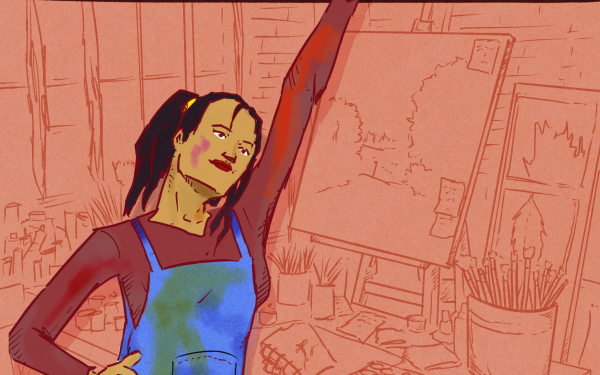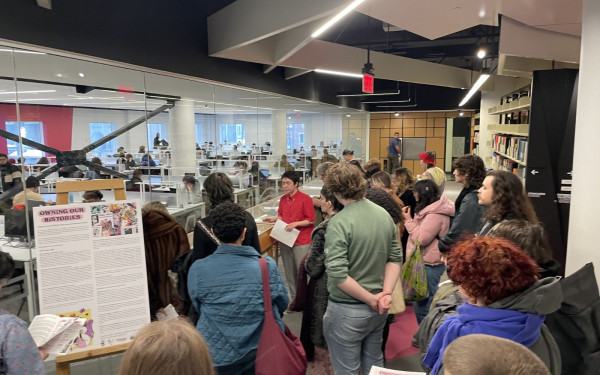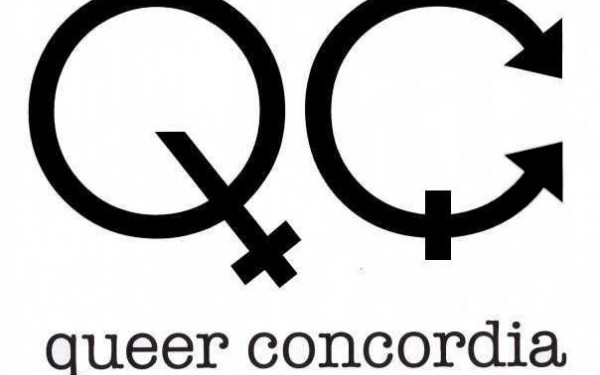New Media Hackers
Concordia students (and a McGill graduate) just won CBC’s 2015 Hackathon and want to revolutionize media by allowing YOU to choose the news.
On March 15th 2015, CBC announced the winner of its annual Hackathon. Marissa Cristiano, Madeleine Lahaie, Mohamed Abdelbaky, Mike Ghenu and Stephanie Pataracchia were crowned the winners of the weekend long event for their ‘Community’ app which hopes to engage users by allowing them to choose the news that they want to see.
CBC challenged the hackers to create innovative solutions to make the news more accessible and interactive as younger newsreaders abandon traditional print media platforms in favor of strictly online news delivery.
“I think we all grew up with a certain structuring quality of the news where you go home, have dinner with your parents and the 6 o’clock news would be on. We’re the first generation where that no longer happens,” Cristiano explains.
While most Hackathons are usually all-night events where caffeine fueled coders hammer away at keyboards in a game of technical oneupmanship, Mohamed credits this year’s victory to his group’s diversity.
“One of the biggest differences in our team was that we had people from different fields whereas a lot of the other groups they were just technical, just programmers and web designers,” Abdelbaky said. “In our team, the ratio was a bit different: two developers and three non-developers.”
The origins of this startup begun when Cristiano, a Communications student at Concordia, who came up with the initial concept. Her friend Lahaie, also a Communications student, has a background in UX development. Together they held up a simple piece of paper at CBC headquarters asking for coders. This plea got the attention of Abdelbaky, a software engineering student at Concordia and Pataracchia, a software engineering graduate from McGill. With the help of public attendee Mike Ghenu, the team completed the winning mock-up in 48 hours.
Winning the event earned them a $2,000 prize, but more importantly, it also gave them a chance to pitch their idea to CBC executives and tech firms.
The concept behind the app is to make news more publicly accessible and interactive. In an age of retweets and Reddit posts, news has transformed dramatically from the legacy days of one way discussions through newspapers or TV.
Even in the forward-thinking frontier of online journalism, every agency, article and blog has a comment section where people can voice their own opinion. Major organizations like CNN have begun utilizing these responses for their own broadcasts.
The theory behind this increasing interactivity is called Gamification; a concept that is changing the way people interact with everything from education to marketing to health care.
The premise is simple. By creating a medium that rewards interactivity, users feel more connected to whatever it is they are doing. Facebook does it with the Like button and Reddit depends on the upvote/downvote system to moderate what appears on their infamous frontpage.
Marissa said she wanted to create something that would lower the barrier of entry for people and deliver to them things they’re interested in, things that they want to see.
To accomplish this, the Community app features a Tinder-like element where users can choose the stories that matter to them by swiping left or right. This then personalizes the news they see by giving CBC direct information about which stories each individual user is interested in. This level of participation turns the user into the editor—able to change the landscape of news itself through interactivity.
But with every breakthrough comes concerns about how this new technology will change traditional publications. The first issue is the comparison to ever-so-simple Tinder itself.
“We found out that Tinder was based on a decision,” Lahaie said. “You make a decision – yes or no, it’s based on that decision and we wanted to get across the fact that this news was going to be based around a personal decision that you make and it’s going to be like youth reclaiming the news.”
The second issue is something that might change how journalists operate forever.
Traditionally, reporters either get assigned stories or pitch their ideas to an editor. At the end of the day, it’s the editor who decides which stories make it to publication.
Community proposes that journalists pitch their ideas directly to the app and gives the user the ability to decide which stories are worth delving into and which aren’t.
This shift would diminish the idea of the exclusive—the “scoop”—and could allow competitors to poach stories—something the CBC addressed directly in the coverage of the event.
“No other news network is engaging the public in that kind of way,” said Cristiano. “It’s about getting over the inherent fear of traditional journalism where we need to own this and we need to be the first ones to deliver this”.
This revolutionary concept still has a long way to go. The team will be developing the app further in preparation for the pitch meeting with the CBC. They will decide whether or not they will officially pick up Community.

1_820_547_90.jpg)


_600_375_90_s_c1.jpg)


